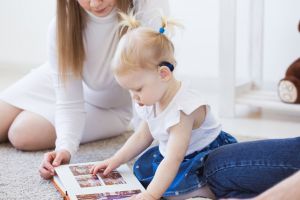“The more that you read, the more you know. The more that you learn, the more places you go,” Dr. Seuss once famously said. He was right. Children of families who read together have closer relationships with their parents, do better academically, develop better communication and logical thinking skills, and are more focused and disciplined.

great way to help your child understand
diversity and inclusion.
Not only that, but reading relevant stories is a great way to teach children about diversity, understanding and inclusion. Why not keep a few books on hearing loss and hearing aids in the house so your kids—regardless of whether they have normal hearing or hearing loss—can learn to celebrate the differences in others?
Ages 4-8
Reading to your children at this age is one of the best things you can do to prepare them for academic excellence. Here are a few picks for preschoolers and young readers:
Jenna Harmke
17-year-old Jenna Harmke wrote this book based on her own experiences. Bessie the bunny is excited to start her first day of preschool, only to come home deflated after realizing she can’t hear hew new schoolmates. After a trip to the audiologist, Bessie gets hearing aids and preschool becomes the fun place it’s meant to be. A great read for younger kids with hearing loss.
Ada Bassett Litchfield
Though this book was originally published more than four decades ago, it still makes our short list. Your child will enjoy reading how a young girl’s hearing loss was detected and treated with the help of a hearing aid. Those with normal hearing will learn about hearing loss, those with hearing loss will identify with the primary character. Just keep in mind that today’s hearing aids look quite different than the body style aid featured in this classic.
I Have a Sister, My Sister is Deaf
Jeanne Whitehouse Peterson
Read along as a sister affectionately describes her younger, deaf sister as someone who likes to run and jump and play, just like everyone else. Part of the Reading Rainbow Book series.
Kate Gaynor
Author Kate Gaynor uses Ben’s birthday party to illustrate the challenges of hearing loss, but also the ways in which we are all the same. A good book to help teach concepts of understanding and inclusion.
Patricia Lakin
Parents and children will enjoy this sweet read, describing the very special relationship a dad has with his deaf son and how they find ways to communicate with each other. A great introduction to American Sign Language (ASL) and Deaf culture, this book is a good read for children of all hearing abilities.
Gary Clemente
This interactive book, written from a young child’s perspective, describes the journey from hearing loss to hearing aid. Readers and/or listeners can interact by answering multiple-choice questions, as well as learning about benefits to wearing hearing aids and how to take care of them.
Ages 9-12
Don’t think you’re off the hook once your child begins reading on their own. Even older children benefit from being read to. That’s because children read at a different level than they listen and can learn important life lessons from books that they may not be willing to hear if you tell them. And, much like when they were younger, reading to kids at this age increases their vocabulary, their sense of security and belonging, and improves your relationship. Here are a couple of titles you may enjoy reading together:
Nancy Butts
Older readers will enjoy this book about a deaf girl named Miranda, who must learn to trust a new friend after her cousin, Timothy, is lost at sea. Author Nancy Butts weaves suspense and intrigue into the story when the two share a mysterious dream about Timothy.
Ann Matthews Martin
When Jessi begins to learn sign language from Matt, a young boy for whom she babysits, she becomes determined to introduce sign language to other interested children in the community. The book is #16 of The Babysitter’s Club series.
Stephen J. and Jodi Michelle Cutler
After 10-year old Jordan is injured in an accident, he finds it difficult to return to his favorite sport of baseball. Fortunately, he meets Luca at summer camp, a deaf boy who wears a cochlear implant and inspires Jordan with a “nothing is impossible” attitude. Find out how they rally together in the biggest game of Jordan’s life.
Read how Addy, who has worn hearing aids for most of her life, discovers a hidden talent that teaches her she is not defined by her hearing loss.
Teens
The practice of reading together as a family really pays off once children enter their teen years. At this age, reading improves vocabulary and writing skills, helps teens navigate complex life issues, broadens their imagination and increases the likelihood of academic success.
Lois L. R. Hodge
Biney is 13 and has hearing loss, but that doesn’t stop her from helping a friend in crisis. The challenge helps her prove to everyone, including herself, just how grown up she really is.
This magazine is for kids and teens with hearing loss, and gives them an opportunity to connect with others experiencing the same issues and challenges. Includes resources for parents and teachers, too.
Hearing help
We hope a few of these entertaining, inspiring and thought-provoking stories make their way into your home. And, if you are concerned about the hearing of your child or anyone else in your family, reach out to a qualified hearing care professional, like the ones listed in our consumer-reviewed directory, for a thorough evaluation and care plan.
